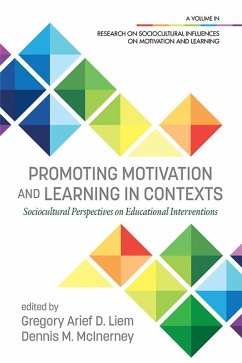The body of literature has pointed to the benefits of educational interventions in facilitating improvement in school motivation and, by implication, learning and achievement. However, it is now recognized that most extant motivation and learning enhancing intervention programs are grounded in Western motivational and learning perspectives, such as attribution, expectancy-value, implicit theories of intelligence, self-determination, and self-regulated learning theories. Further, empirical evidence for the positive impacts of these interventions seems to have primarily emerged from North American settings. The cross-cultural transferability and translatability of such educational interventions, however, are often assumed rather than critically assessed and adapted before their implementation in other cultures. In this volume, the editors invited scholars to re-assess their intervention work from a sociocultural lens. Regardless of the different theoretical perspectives and strategies they adopt in their interventions, these scholars are in unison on the importance of taking into account sociodemographic backgrounds of the students and sociocultural contexts of the interventions to optimize the benefits of such interventions. Indeed, placing culture at the heart of designing, implementing, and evaluating educational interventions could be a key not only to strengthen the effectiveness and efficacy of educational interventions, but also to ensure that students of a wider and more diverse range of educational and cultural backgrounds reap the benefits from such interventions. This volume constitutes the foundation towards a deeper and more systematic understanding of culturally relevant and responsive educational interventions.
Dieser Download kann aus rechtlichen Gründen nur mit Rechnungsadresse in A, B, BG, CY, CZ, D, DK, EW, E, FIN, F, GR, HR, H, IRL, I, LT, L, LR, M, NL, PL, P, R, S, SLO, SK ausgeliefert werden.









